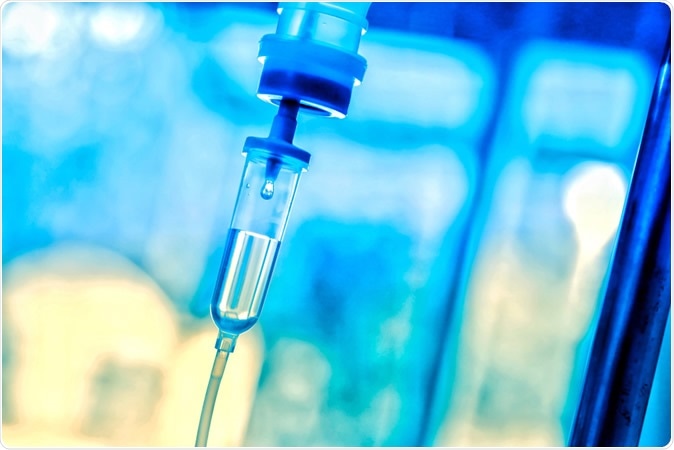A randomized clinical trial showed that combining Vitamin C and thiamine with standard steroid hydrocortisone did not improve the time of survival for patients with septic shock. The study titled, “Effect of Vitamin C, Hydrocortisone, and Thiamine vs Hydrocortisone Alone on Time Alive and Free of Vasopressor Support Among Patients With Septic Shock: The VITAMINS Randomized Clinical Trial,” was published in the most recent issue of JAMA. The results were also presented at the Critical Care Reviews Meeting 2020 in Belfast, Northern Ireland.

Image Credit: Numstocker / Shutterstock
There have been speculations regarding the additional benefits of combining Vitamin C and thiamine with standard hydrocortisone therapy for patients with septic shock. In this clinical trial the team included 216 patients with septic shock. The population was randomly assigned to receive either the combination of the three medications or intravenous hydrocortisone alone.
The authors wrote that sepsis is often life threatening and occurs due to an over active immune system that gets activated due to an overwhelming infection. This hyperactive immune system goes on to damage major organs leading to multi organ failure and septic shock. The team wrote that sepsis causes around one third to one half of all the hospital deaths. Over 5 million people across the globe die of sepsis the team wrote. In patients with septic shock there is a circulatory collapse for which the patient may require blood pressure raising medications or vasopressors. Studies have shown that high doses of vitamin C acting as an antioxidant can help in septic shock due to its anti-inflammatory properties. Thiamine too can help patients with septic shock because as many as one in five persons with sepsis are deficient of this vitamin write the researchers.
VITAMINS Trial Result
VITAMINS Trial Result from Critical Care Reviews on Vimeo.
This was a multicentric (based in 10 intensive care hospital set ups), open label (where all patients and/or family members knew if they were receiving the three drug combo or hydrocortisone alone), randomized (109 and 107 patients were randomly assigned to either study arm) clinical trial. The study was conducted across ICUs from Australia, New Zealand, and Brazil. The patients were defined as Sepsis-3 grade of septic shock. The study spanned between May 2018 and July 2019. The patients in the three drug arm received “intravenous vitamin C (1.5 g every 6 hours), hydrocortisone (50 mg every 6 hours), and thiamine (200 mg every 12 hours)” and the patients on the control arm received IV hydrocortisone 50 mg 6 hourly. The regimen for both arms was continued till there was resolution of symptoms or up to 10 days.
Results showed that use of the three drugs instead of hydrocortisone alone did not significantly increase the time the patients stayed alive and did not require blood pressure raising medications for a seven day period. On an average the three drug combo allowed a 122.1 hours alive without vasopressor drugs and hydrocortisone allowed 124.6 hours. The difference was not significant. Results also showed that ninety day mortality was 28.6 percent or 30 out of 105 in the three drug group and 24.5 percent or 25 out of 102 in the hydrocortisone group. Neither group showed any serious side effect due to use of the drugs.
The authors could surmise thus that the combination of the three drugs did not provide an added benefit in septic shock. The team wrote in conclusion, “The finding suggests that treatment with intravenous vitamin C, hydrocortisone, and thiamine does not lead to a more rapid resolution of septic shock compared with intravenous hydrocortisone alone.”
In an accompanying editorial by Andre C. Kalil, titled, “Lack of Benefit of High-Dose Vitamin C, Thiamine, and Hydrocortisone Combination for Patients With Sepsis,” the study findings were further discussed. The author of the editorial spoke of another similar trial and wrote, “Considering the available evidence from more than 2000 patients in both observational and randomized studies, there is insufficient equipoise to continue enrolling more patients in sepsis trials involving high-dose vitamin C administration.”
Kalil added that there are at present 13 studies from across the world that have shown that the combination of vitamin C, thiamine and hydrocortisone do not provide any survival benefit in patients with septic shock. The author called for diverting these funds for research looking at the underlying molecular mechanisms of septic shock and development of other and more effective sepsis therapies. Kalil adds that these studies need to stop, “stifling the development of other sepsis therapies; perpetuating false hopes for patients, families, and clinicians; and delaying proven lifesaving therapies such as prompt initiation of antibiotic therapy.”
Journal reference:
Fujii T, Luethi N, Young PJ, et al. Effect of Vitamin C, Hydrocortisone, and Thiamine vs Hydrocortisone Alone on Time Alive and Free of Vasopressor Support Among Patients With Septic Shock: The VITAMINS Randomized Clinical Trial. JAMA. Published online January 17, 2020. doi:10.1001/jama.2019.22176